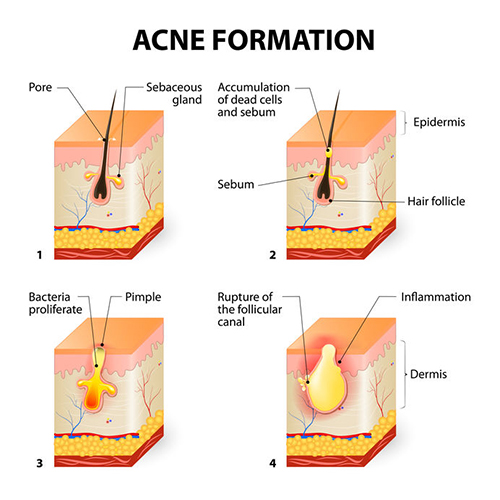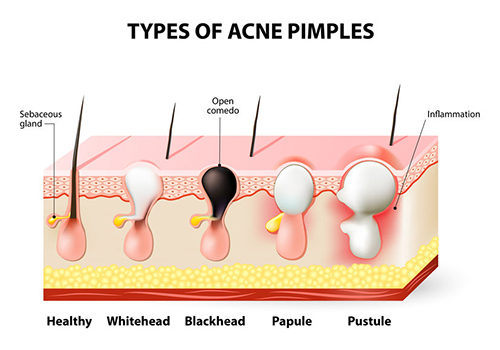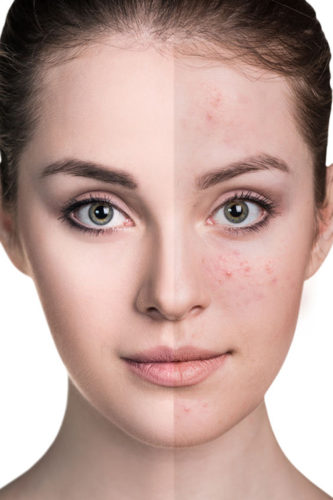Acne is a common skin condition that can cause symptoms ranging from discomfort to permanent scars. A dermatologist can help improve your symptoms and reduce the frequency of acne.
What is Acne?
 Acne is a skin condition that occurs when your pores become clogged with a combination of oil and dead skin cells. This condition most frequently occurs in young adults and teenagers but can affect anyone regardless of age.
Acne is a skin condition that occurs when your pores become clogged with a combination of oil and dead skin cells. This condition most frequently occurs in young adults and teenagers but can affect anyone regardless of age.
Some people may experience an outbreak of acne every once in a while. Others may experience ‘persistent’ acne, where one outbreak of acne resolves and is immediately followed by another.
Acne can develop on your face, neck, chest, shoulders or back. There are several types of acne, which can broadly be categorized as inflammatory or non-inflammatory.
Non-Inflammatory Acne
 As the term suggests, non-inflammatory acne does not cause redness or inflammation. Blackheads and whiteheads can heal on their own, and in some cases, you might not notice them at all.
As the term suggests, non-inflammatory acne does not cause redness or inflammation. Blackheads and whiteheads can heal on their own, and in some cases, you might not notice them at all.
- Blackheads: Pores that become clogged with sebum (an oil naturally produced by the sebaceous glands under the surface of your skin) at the surface of the skin. The exposed pimple turns dark brown or black when exposed to the air, and is not accompanied by redness or swelling.
- Whiteheads: Pores that become clogged but which stay just below the surface of your skin, creating a whitish pimple that is not accompanied by redness or swelling.
Inflammatory Acne
When blackheads and whiteheads do not heal on their own, they can become inflamed. Inflammatory acne may be accompanied by redness, swelling, and tenderness due to ruptured follicles and infections below the skin surface.
There are four types of inflammatory acne:
- Cysts: A severe form of acne in which a blocked pore becomes infected and fills with pus. Cysts form deep within your skin and can be small or large in size.
- Nodule: A severe form of acne in which a broken follicle leads to an infection and swelling. This type of pimple is generally large and forms deep within your skin.
- Papule: A type of acne where the follicle in a clogged pore breaks and causes an infection. These are generally pink or red bumps that may feel inflamed and tender to the touch.
- Pustule: A pustule occurs after a papule forms. These are papules where pus has formed just below the surface of the skin, causing the trademark white appearance of a ‘zit’.
Causes of Acne
 The exact causes of acne are still unclear, but certain factors can contribute to its development in some people, including:
The exact causes of acne are still unclear, but certain factors can contribute to its development in some people, including:
- Hormonal changes
- Heredity
- Oil production
- Certain medications
- Sugar intake
- Oily lotions or creams
- Pressure on your skin such as helmets, tight fabric, collars, or the like
Acne can be exacerbated by environmental factors such as:
- Picking at your skin
- Stress
- Pollution
- Frequent exposure to oily or greasy substances, such as in a kitchen
Treating Acne with Andover Dermatology
Acne is different for everyone, and no two treatment plans will be the same. Your acne may be treated with oral or topical medication. Adjustments to your lifestyle may also help improve acne frequency. At Andover Dermatology, we consult with you to develop a custom treatment plan tailored to your skin type and personal preferences.
Give us a call to learn more about how we can help you. We’re excited to help you manage your acne and look your best.

